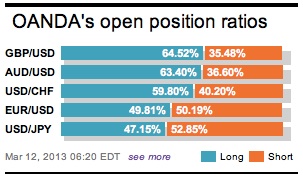Yen and more selling of it about sums it up for another relative dull overnight forex session perforated with a few CNY band-widening rumors. Well, it was dull until the release of disappointing UK data continued their economy’s dismal uninterrupted economic run. USDJPY traded to 96.70, a three and a half year high, in response to dovish comments from Kikuo Iwata, nominee for BoJ deputy governor and on reports that BoJ Governor nominee Kuroda will hit the ground running, and launch easing steps as soon as next week.
Market reports suggest that an unscheduled Bank of Japan policy meeting may take place immediately after the new BoJ governor takes office on March 20th. This move would obviously allow time for BoJ staff to study “the practicalities of any new easing proposals before a final decision can be made at the scheduled meeting on April 3-4.” Until then USD/JPY can only do one thing and that’s stay relatively bid. One wonders now how much longer other Asian central banks can go without reacting to the weak Yen threat?

The loudest section of the forex market is trying to bully the masses into believing that holding the dollar is the best chance of a winning hand. More analysts are now expecting the ‘mighty’ buck to sharply outperform GBY, JPY and AUD and some of the other noted G10 members, thanks to higher US yields and an improved US balance sheet. This morning’s disappointing UK data and Sterling showing, along with a predisposed ‘bear’ Yen market is proving this point strongly.
UK industrial Production was expected to be +0.1% for January, but instead declined to -1.2% this morning, accompanied with a disturbing downward revision to the December print to -2.1% from -1.7%. Sterling immediately reacted and took out the 2010 outright low. It seems that sterling rally selling is now the ‘mantra.’ Manufacturing output was also weaker than expected coming in at -1.5%, m/m, compared to expectations of a flat reading with some modest backward revisions. If the UK economy manages to contract again in Q1 of this year, it will officially be back in recession, the third one in five-years!

Consumer price inflation in Germany, the Euro-zones backbone, remains well below the ECB’s comfort zone of +2% last month. In fact it has fallen to the lowest annual reading in 27-months. The official headline print eased to +1.5% from +1.7%, m/m. The usual suspects, energy (+3.9%) and food (+3.1%) managed to show a more moderate increase than in the previous month. Excluding the ‘suspects’ and the CPI reading would have been a paltry +1.1%.
Other data releases this week should be capable of emphasizing the growing divergence between the still ‘accommodative’ ECB and the increasingly ‘neutral’ Fed. The harsh realities of Euro periphery data continues to show that the economies of most debtor countries are still contracting, and Germany alone cannot be the sole supporter. A positive surprise from US Retail Sales and perhaps industrial production data could add further pressure to the EUR and support the “cyclical tailwinds” of the dollar across the board.
Beware of the “underclass”! It is now becoming a stronger argument against the 17-member currency to survive. Joblessness – a consequence of austerity and reform – is beginning to successful create a Euro class-divide. The unemployed numbers are frightening. Currently, there are +19m individuals (+11.9%) unemployed within the union, including one in every two under 30 in Greece, Portugal, Spain and parts of Italy. Idle youths with no income and little chance of a productive livelihood is a dangerous mix, and very capable of raising the threat of full social breakdown. This is expected to be a top priority topic at this weeks EU summit. While across the pond, stronger employment numbers has the CAD market a tad confused.
Canadian CAD Order Boards remain relatively bare after last Friday’s flush out. Spring fever or March Madness is allowing noise to dominate forex movement sentiment for the loonie. Corporate sellers have maintained their selling interest atop of 1.3020 levels, and buyers remain a big figure below. This consolidated trading range is keeping most players happily on the sideline and away from any illiquid trouble. A 1.0280 knockout option later this morning could make it more interesting if we continue to wallow in such hollow levels. A plethora of system “Stop & Reversal” sell orders are dotted below 1.0235, 1.0190 and 1.0150. The main event remains EUR/Dollar spreads.

The single currency continues to beat the same ‘trend’ path for the time being. The EUR/USD is still locked to 1.3000 with talk of a large expiry, hence the medium term gravitation. It seems that the 1.3050 ‘pop’ has alleviated any oversold situation after last weeks US employment release. The mighty buck remains better bid across the board; an entrenched trend that seems to be well supported by US treasury yields. Why buck the trend? This consolidation is now favoring the shorts as the growth of stop-losses below the single units 1.2950 level may eventually shift market focus from 1.3000!

Other Links:
Low Volatility After NFP Friday
This article is for general information purposes only. It is not investment advice or a solution to buy or sell securities. Opinions are the authors; not necessarily that of OANDA Corporation or any of its affiliates, subsidiaries, officers or directors. Leveraged trading is high risk and not suitable for all. You could lose all of your deposited funds.


